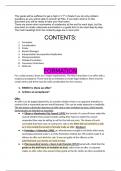Summary
Summary Contract Law Oxford PQ Summaries or Guide All Contract Topics
- Module
- Contract
- Institution
- Oxford University (OX)
This guide will be sufficient to get a high 2.1/1st in finals if you do only problem questions as you will be able to answer all PQs. If you learn what is on this document you will be ready to take your final exam. There are some minor summaries of academics at the end for each topic, but the docu...
[Show more]



